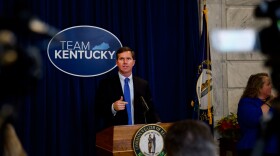There’s a Kentucky phenomenon, where, before it snows, people rush stores for milk and bread.
Sharon Bayens has worked at Kroger for 38 years and she’s seen plenty of “snow scares,” but she’s never seen anything like what’s happened over the last month because of the coronavirus pandemic.
“We’re afraid. We really are. We’re afraid. We’re around thousands of people every day and we’re like, ‘OK is this the person that’s going to give me the coronavirus?'” Bayens said.
At the outset of the pandemic, uncertainty caused a rush of panic-buying at grocery stores across the state, said Caitlin Blair, a spokeswoman for United Food and Commercial workers Local 227. Stores were crowded and employees worked long hours to try and meet the demand, she said.
Bayens, who serves on the union's executive board, says it started on a Tuesday in early March, when Kentucky Gov. Andy Beshear talked about closing the schools. Hundreds of people lined up outside her Louisville Kroger branch demanding to be let in.
The job is difficult, but rewarding, she said.
"My purpose right now is to make sure people get what they need. That they are able to feed their families," Bayens said.
Customers have offered their appreciation. Restaurants have bought lunch for store workers, and several people have even tried to hug Bayens, she said.
"I kind of put my hands up and say, 'Now, I appreciate it, but we can't hug," Bayens said.
But the pandemic has also brought out a darker side too. She’s seen people hoarding paper towels and toilet paper. And when cashiers asked people to only take what they needed, they were cussed at and spit on, she said. On top of that, some people have loaded groceries carts full and walked out the door without paying, Bayens said.
Her biggest fear is that she might bring the virus back home to her mom.
“I’m just so upset to see people act like this. It terrifies me, the fact that I could bring this home to her. I love my job, I love what I do and I hope that people appreciate what we do for them because it means a lot of to everyone I work with. They all feel the same way I do,” Bayens said.
Initially, management downplayed the threat in store meetings, Bayens said. Employees were told it was “unprofessional” to wear face masks, she said. And Kroger managers are supposed to be limiting the number of customers coming into her store, but Bayens said they aren’t doing that.
“Our management team sits in their office, basically quarantined upstairs all day, every day. If there is an issue, they make the employees handle it,” she said.
Kroger started giving workers at her store cloth masks last week. Kroger is offering hazard pay, a $2 increase. And they’re installing Plexiglas shields to separate cashiers from customers.
Kroger has also taken extra precautions to keep the store clean.
“Every morning when we go in, we wipe down the telephones, we wipe down the registers, all the counters, all the slicers used to get cleaned once an hour now they get cleaned twice an hour. I mean everything is shiny, clean, but you can’t see the germ, so we’re always cleaning,” Bayens said.
Kroger has not responded to opportunities to comment on her experience.
Gov. Andy Beshear has labeled grocery workers as essential employees, ensuring them childcare services while they’re at work.
And Bayens says that customers can also help workers. The best way to do that is by limiting number of people who go into the store, and limiting the time you spend inside. Kindness helps too.
“Because like I said, everybody is worried and stressed out and overwhelmed by all this, just a simple thank you, something like that, it goes a long way.”






